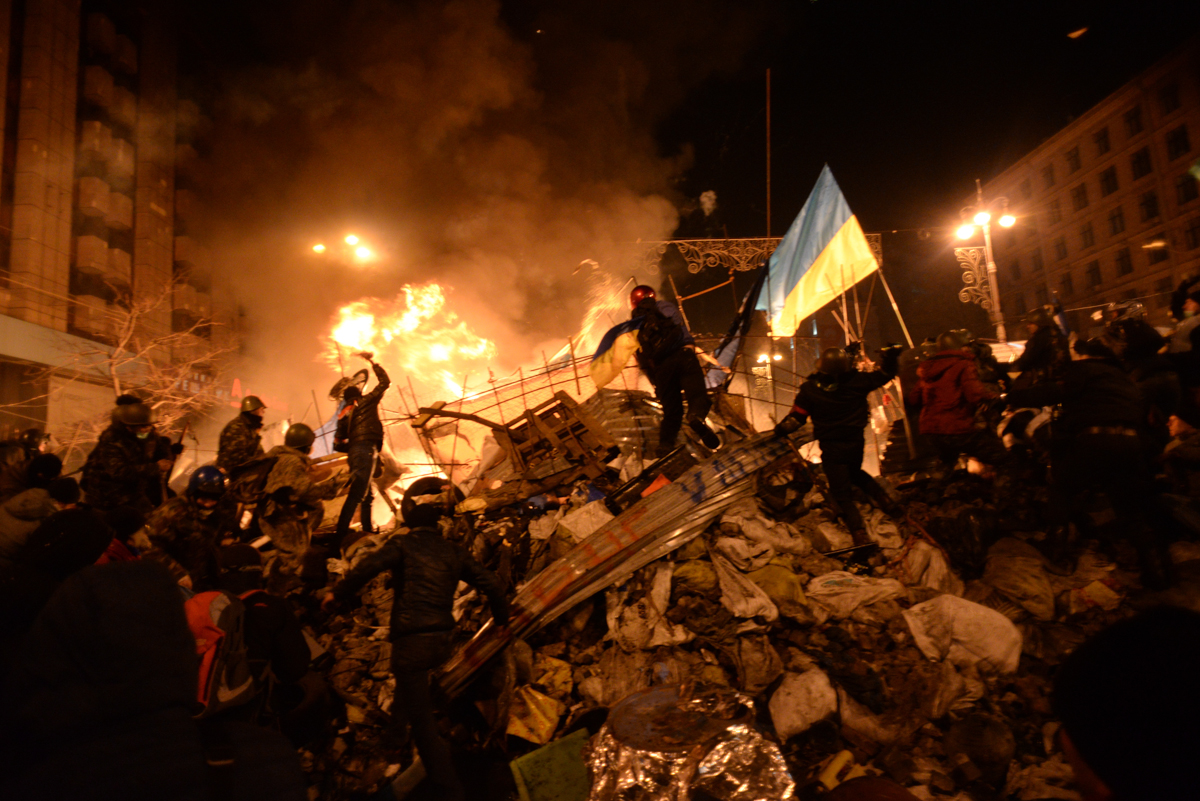Hundreds of people gathered in the courtyard outside the headquarters of the regional government to demand a referendum on granting greater autonomy to the east. They were met by dozens of security personnel in riot gear.
Armed men with sticks and metal bars proceeded to storm the building, and once inside, open the building's unprotected main entrance to allow in the demonstrators outside.
More pro-Russian activist later overran the building house and the prosecutor's office and then attacked the headquarters of the interior ministry's police force.
About 20 gunmen reportedly opened fire on the police station with automatic weapons and threw stun grenades to force officers inside the building to surrender.
 |
| Pro-Russian Militants open fire on Luhansk's police headquarters. Photo by BBC |
Following the takeovers, Ukrainian Interim President Olexander Turchynov criticized local police for their "inaction" and demanded the dismissal of the police chiefs in Luhansk and Donetsk, where dozens of cities have been seized by pro-Russians.
Meanwhile, pro-Russian activist in Sloviansk continue to detain roughly 40 people, including seven military observers from the Organisation for Security and Co-operation in Europe (OSCE)..
One member of the OSCE team was released on Sunday for medical reasons.
Self appointed "people's mayor" of Slovyansk, Vyacheslav Ponomaryov, said on Tuesday evening that "good progress" had been made at talks with OSCE representatives. Earlier, he had warned that the observers would only be released if the E.U. dropped its sanctions against the pro-Russian Separatist leaders.
The E.U. recently published a new list of 15 individuals facing travel banks and asset freezes: Gen. Valery Gerasimov, chief of the Russian General Staff; Lt. Gen. Igor Sergun, head of Russia's military intelligence agency, the GRU; and Russian Deputy Prime Minister Dmitry Kozak were some of those mentioned by the EU.
Pro-Russian separatist leaders in Crimea, Luhnsk, and Donetsk were also mentioned.
On Monday, the U.S. announced new sanctions as well, this time against seven individuals and 17 companies it said were apart of Russian President Vladimir Putin's "inner circle".
But these sanctions, which were meant to damage Russia's "already weak economy", seems to have had no affect. Moscow's stock market has rebounded for the second time following the latest series of sanctions. While Russian officials have acknowledge that the economy will be affected by the sanctions, some have said that the U.S. and the E.U. are only damaging themselves.
However, U.S. Treasury Secretary Jack Lew said that the sanctions have caused "substantial deterioration" to Russia's economy.
In other developments:
- A NATO official said on Tuesday that there is no sign of Russian troops having left the Ukrainian-Russian border, despite Defense Minister Sergei Shoigu saying otherwise on Monday.
- U.S. journalist Simon Ostrovsky described his detainment in the latest Vice News Ukraine Dispatch. Simon described being threatened, beaten, and left in a cold cellar for three days by pro-Russian activist.
So what do the Ukrainian people have to say about the crisis in Ukraine? Well you have differing opinions. Majority of people in eastern Ukraine are for a united-Ukraine. But mixed in with them are pro-Russians, some of who have gone to violent ends in effort to achieve their wishes, resulting in the pro-Russian occupation of most of eastern Ukraine. One particular Ukrainian citizen said in a interview by BBC, "I am, without a doubt, for a unified Ukraine. Honestly, I'm fed up with everything that is happening... people are afraid to walk on the streets, and in general, go out Majority of the stores aren't working.
"I would like everything to calm down, but I wouldn't like to go to Russia. It wouldn't be better there."

